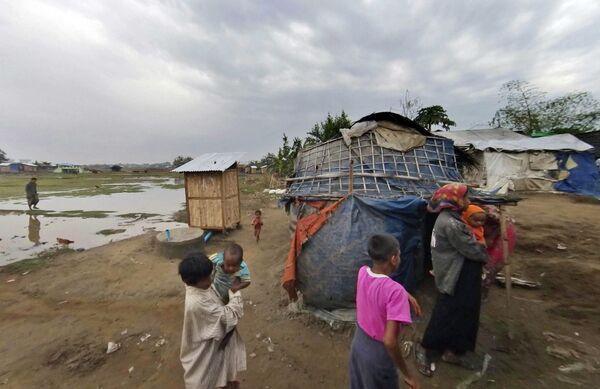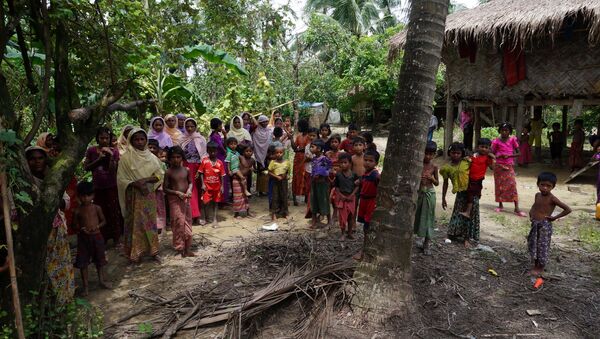The World Food Programme (WFP), a UN agency, conducted their assessment in the villages of western Rakhine state, where approximately 75,000 stateless Muslim Rohingya people have fled a bloody army crackdown.
The WFP report has found that many of the people are "wasting" away.
Those people that remain in Rakhine state are now suffering the impact of a deadly food crisis.
The WFP found that one-third of homes are experiencing extreme food deprivation. In one area, a town called Maungdaw, where there is worsening violence, some households will go without food for over 24 hours.
#Myanmar: UN expert lists catalogue of concerns as human rights slide in worsening conflict https://t.co/cdmlkcRFgg
— UN Human Rights (@UNHumanRights) 24 July 2017
"In the report, WFP refers to Maungdaw District as one of the areas in Myanmar where high rates of food insecurity have been already prevalent for a prolonged period of time and the worsening of the situation in already highly vulnerable and food-insecure areas has been observed," WFP told Sputnik.
The organization said that 90 percent of families were worried about not having enough food, whereas 60 percent have reduced the number of meals, and a third have ended up begging for food.

"None of the children under two surveyed were getting an adequate diet. Most families live hand-to-mouth on what cash they can earn on a daily basis, as lower wages and reduced employment opportunities have had a major impact on food security. In about one third of surveyed families there were one or more members who had gone at least one whole day and night without eating in the 30 days prior to the survey. People also can no longer afford more nutritious foods. Markets have been disrupted leading to food shortages, especially of dried fish, fresh vegetables, oil and pulses. Food prices were highly volatile," WFP said.
They said that high food insecurity and limited access to essential services including health care, as well as safe water and sanitation, may have exacerbated an already serious malnutrition situation as evidenced by the Demographic Health Survey by the Ministry of Health and Sports in 2015-2016 in Rakhine State, where the Global Acute Malnutrition (GAM) was at 13.9 percent while the Severe Acute malnutrition (SAM) stood at 3.7 percent.
Food security worsens in part of western #Myanmar — @WFP https://t.co/6BV0bvvbfR
— ReliefWeb (@reliefweb) 6 July 2017
There are many causes to this crisis. The WFP says that poor nutritional health for people living in the northern party of Rakhine is a complex and "multifaceted situation."
"The main determinants are related to food insecurity (poor access, availability and utilization of food); poor and sub-optimal infant and young child feeding practices (poor quantity and quality of food for children); limited access to health services; and inadequate access to hygiene and sanitation," WFP told Sputnik.
WFP said that to manage food gaps, households relied on disruptive coping strategies. For example, many simply changed their diet by switching from a preferred food to a cheaper substitute or they may ration what food they have available.
UN expert to visit Myanmar to assess rights impact of worsening security situation https://t.co/xMMGZoGXuq
— UNICYangon (@UNICYangon) July 7, 2017
Sometimes households may have to take more extreme measures that may negatively affect their future — thus, a family might have to stop buying medicine or stop sending children to school, or might sell assets like an animal or tools, or might spend savings or pawn possessions.
According to WFP's survey, 80,000 children are at risk, and the most vulnerable people are nursing mothers, pregnant women and adolescent girls.
Access to training and medical equipment can help rural clinics in #Rakhine tackle maternal and infant mortality. #Myanmar pic.twitter.com/7yV3gv6Qw4
— ICRC (@ICRC) July 24, 2017
Other risk groups are the elderly and those with disabilities.
The WFP is currently facing a crisis of its own, as the UN agency battles to overcome a funding shortfall of US$24 million. As a result the UN agency is appealing to the international community for urgent funding in order to address the severe food insecurity and malnutrition with an emergency response in Rakhine State.
#Myanmar's #Rohingya "terrified" amid violence, says @UNHumanRights expert, @UN_Radio Geneva reports: https://t.co/tTMScrrJ16 pic.twitter.com/ogaJR0Wt7J
— UN Geneva (@UNGeneva) July 25, 2017
"The recent WFP food security assessment results are a renewed call for immediate life-saving food assistance and emergency nutrition support in Maungdaw District with the consideration of sustained long-term multi-sectoral interventions in the both communities of Rakhine State," WFP told Sputnik.



